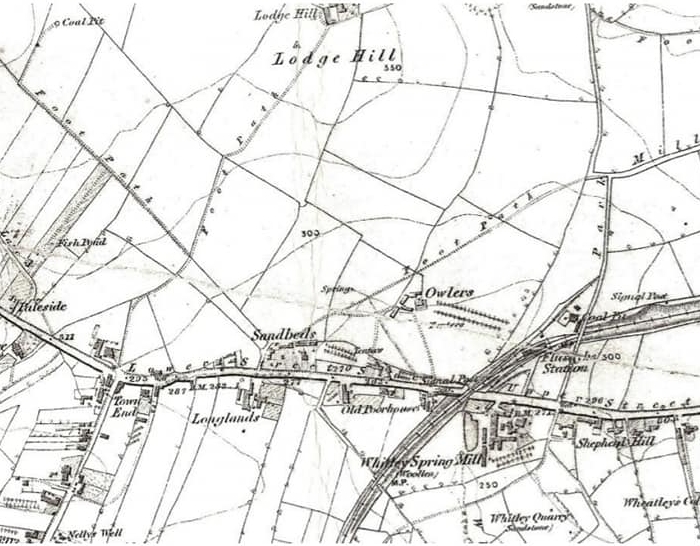2nd Corporal Joseph Charlesworth, MM, 98466, 223rd (Leeds) Field Company, 31st Division, Royal Engineers
Born in Ossett in 1878, Joseph Charlesworth was one of eight children of David and Hannah (nee Dawson). At that time, David Charlesworth was a farm labourer and probably worked where he lived; in the area of Low Laithes and Lodge Hill, somewhere between Tufty Farm and Owlers Farm (once owned by the Earl of Cardigan)
 .
.
Sadly, when Joseph was eight, his mother Hannah died; she had recently given birth to her eighth child, Mary Alice. A few weeks after the death of their mother, the younger children: Bessie born in 1882, Dawson born in 1884 and the new baby, Mary Alice were all baptised at St Paul's, Alverthorpe.
By the age of 13 years, Joseph and his older brother, David, were market gardeners. Their father was now a farmer and the family lived at Carr Gate, Wakefield. In March 1906, Joseph, now employed as a teamer (the equivalent of a truck driver of today), married Amy Forster at St Peter's, Morley and the following year their daughter Ethel was born. The young family shared the home of Amy's parents at New Brighton, Morley.
In May 1915, Joseph, now 37 years of age, enlisted as a driver in the 223rd (Leeds) Field Company 31st Division of the Royal Engineers. On July 7 1915 Joseph was appointed to the 223rd's Labour Corp (unpaid). On August 4th 1914, Great Britain declared war on Germany and on September 15th 1914, Joseph became a fully paid sapper.
Joseph Charlesworth's service record has survived and from it we can see that he was of an "exemplary character". This is apparent by his early promotion to 2nd corporal, only five days later.
The Field Company of the Royal Engineers provided technical skill in support of the Division's fighting units. The Royal Engineers maintained the railways, roads, water supply, bridges and transport. They also operated the railways and inland waterways. They maintained the telephones, wireless and other signalling equipment and they designed and built the frontline fortifications. The technically skilled Royal Engineers developed responses to chemical and underground warfare. Without the Royal Engineers the infantry and artillery would have soon been powerless, as they maintained the guns and other weapons.
Joseph arrived in Port Said in December 1915 as a part of The Mediterranean Expeditionary Force (MEF). The MEF commanded all Allied forces at Gallipoli and later Salonika. The Gallipoli campaign (April 25th 1915 - January 9th 1916) was the land based element of a strategy intended to allow Allied ships to pass through the Dardanelles and capture Constantinople (now Istanbul).

The following February Joseph left Port Said for Basrah, where he contracted malaria and was subsequently admitted to hospital. His wife, Amy, was desperate for information about him and she wrote a letter to his commanding officer, shown above.
On July 2nd 1917 Joseph arrived in France. He was hospitalised again a few months later. Joseph rejoined his unit in January 1918 and in August that year he was given leave to return to England to visit his family. This would be the first time in three years that his wife and his 11 year old daughter Ethel had seen him.
Joseph Charlesworth survived the war and was awarded not only the 1914-1915 Star, but also the British War Medal and the Victory Medal.

Above: 2nd Corporal Joseph Charlesworth was also awarded the Military Medal for acts of gallantry and devotion to duty under fire. This medal was awarded to the Other Ranks (Non Commissioned Officers and Men) and was the equivalent to the Military Cross (MC) which was awarded to commissioned officers.
Upon his return from WW1, Joseph Charlesworth continued to earn his living as a teamer / driver. He died in Morley in 1960 at the age of 82.
My thanks to Anne-Marie Fawcett for her research and the biography of Joseph Charlesworth.
References:
2. "The Corps of the Royal Engineers in the First World War"